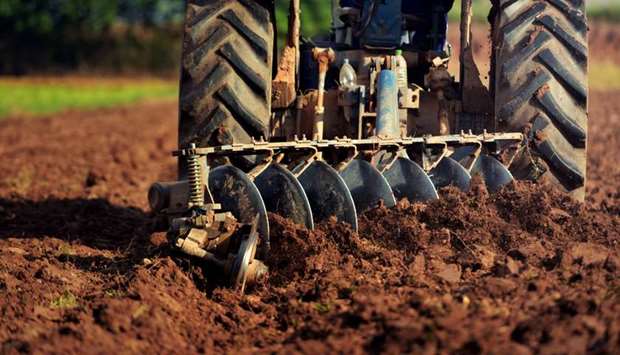The agri-nutrients industry in Qatar and elsewhere in the GCC supports the food supply of 5% of the world’s population, or 350mn people across the globe, according to a new report published by the Gulf Petrochemicals and Chemicals Association (GPCA).
This figure marks the rising importance of agri-nutrients in enhancing global food security in a rapidly changing world, where it's needed to produce 70% to 100% more food by 2050 to feed the world’s growing population.
The findings were highlighted in a new report entitled "Role of Agri-Nutrients in Food Security" released on the occasion of World Food Day organised by the UN.
The report further reveals that over the last five decades, a portion of the global population supported by agri-nutrients manufactured by GCC producers has increased 33 times, from about 9mn in 1970 to 350mn currently.
The GCC agri-nutrient industry supports about 12,100 direct jobs in the region, and almost three times as many indirect and induced jobs, which means that every person working in the sector supports enough food production to feed about 30,000 people worldwide, including people in the GCC.
Additionally, every person employed by the regional industry supports 17.7 tonnes of three main crops production per year (rice, wheat and maize), underlying the significance of the Arabian Gulf region in supporting global food security.
The Covid-19 pandemic has put food security and the nutrition of millions of people under threat, with many of the affected populations already suffering from malnutrition.
According to the Food and Agriculture Organisation (FAO) of the United Nations, the number of people joining the ranks of those suffering from malnutrition post the pandemic may range from 14.4mn to 38.2, or even 80.3mn depending on the GDP contraction.
The role of agri-nutrients during the pandemic has been essential in meeting the needs of billions of people across the globe and ensuring the uninterrupted supply of nutrition to the world’s population.
In the midst of the coronavirus crisis, production of agricultural chemicals including fertilisers and crop protection chemicals declined by 5% between January and May 2020 globally. Furthermore, capacity utilisation fell from 81.5% in January to 75.1% in May 2020.
Comparatively, in the GCC, fertiliser producers continued to produce essential fertilisers and supply their global customers without significant production and supply chain disruptions.
Dr Abdulwahab al-Sadoun, secretary general, GPCA, commented, “The GCC region is an important, global centre for the production and export of agri-nutrients, which have proven to be essential for enhancing global food security, particularly during the current crisis. The global community must work together to ensure open and free international trade and protect food supply chains by providing essential agri-nutrient inputs.”
He said, “Furthermore, we must keep domestic supply chain functions operational to ensure the smooth export of fertilisers, all while taking the necessary precautions for the safety and wellbeing of our employees. International cooperation will be equally important for all countries and regions to have sufficient supply of all agricultural inputs and outputs.”
The GPCA represents the downstream hydrocarbon industry in the Arabian Gulf. Qatari petrochemical and chemical producers are members of the GPCA.
The findings were highlighted in a new report entitled "Role of Agri-Nutrients in Food Security" released on the occasion of World Food Day organised by the UN.
The report further reveals that over the last five decades, a portion of the global population supported by agri-nutrients manufactured by GCC producers has increased 33 times, from about 9mn in 1970 to 350mn currently.
The GCC agri-nutrient industry supports about 12,100 direct jobs in the region, and almost three times as many indirect and induced jobs, which means that every person working in the sector supports enough food production to feed about 30,000 people worldwide, including people in the GCC.
Additionally, every person employed by the regional industry supports 17.7 tonnes of three main crops production per year (rice, wheat and maize), underlying the significance of the Arabian Gulf region in supporting global food security.
The Covid-19 pandemic has put food security and the nutrition of millions of people under threat, with many of the affected populations already suffering from malnutrition.
According to the Food and Agriculture Organisation (FAO) of the United Nations, the number of people joining the ranks of those suffering from malnutrition post the pandemic may range from 14.4mn to 38.2, or even 80.3mn depending on the GDP contraction.
The role of agri-nutrients during the pandemic has been essential in meeting the needs of billions of people across the globe and ensuring the uninterrupted supply of nutrition to the world’s population.
In the midst of the coronavirus crisis, production of agricultural chemicals including fertilisers and crop protection chemicals declined by 5% between January and May 2020 globally. Furthermore, capacity utilisation fell from 81.5% in January to 75.1% in May 2020.
Comparatively, in the GCC, fertiliser producers continued to produce essential fertilisers and supply their global customers without significant production and supply chain disruptions.
Dr Abdulwahab al-Sadoun, secretary general, GPCA, commented, “The GCC region is an important, global centre for the production and export of agri-nutrients, which have proven to be essential for enhancing global food security, particularly during the current crisis. The global community must work together to ensure open and free international trade and protect food supply chains by providing essential agri-nutrient inputs.”
He said, “Furthermore, we must keep domestic supply chain functions operational to ensure the smooth export of fertilisers, all while taking the necessary precautions for the safety and wellbeing of our employees. International cooperation will be equally important for all countries and regions to have sufficient supply of all agricultural inputs and outputs.”
The GPCA represents the downstream hydrocarbon industry in the Arabian Gulf. Qatari petrochemical and chemical producers are members of the GPCA.


